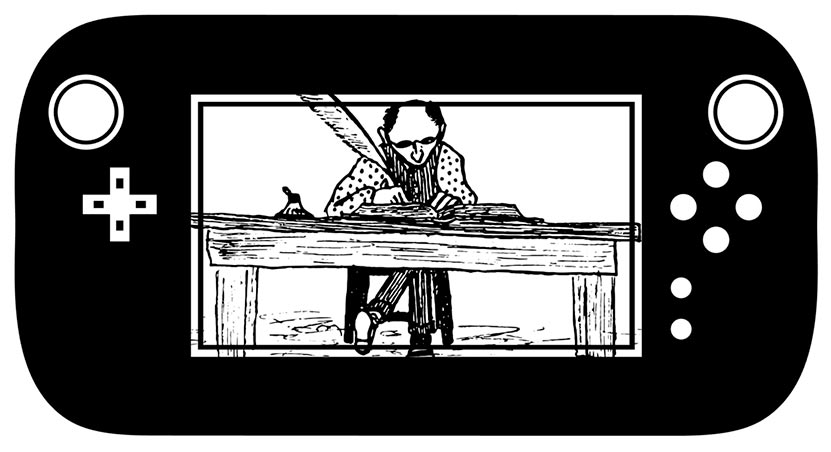Give your opinion
Where stories live

Carlos Cebrián Cuesta, visiting professor of the subject de Creación de mundos: la narrativa en los videojuegos of the School de Philosophy y Letras and author of the book How strange everything is on the surfaceinvites us to discover the creative potential that abounds in the world of video games.

I love video games. I say it like that, quick and simple, because many grey-haired people, like me, sometimes have to say it with a half-smile and an apologetic gesture. Video games are part of my cultural baggage and so it is not surprising that they are hooked on my writing, in the same way that any other enriching life experience will have become entangled. There have always been video games among my books, records and VHS tapes because I was lucky enough to start enjoying them almost from the dawn of the industry.
And all, like many other things, thanks to my father.
It was the seventies. He was also passionate about them and he would take me to the only cafeteria in town that had an arcade machine, an Atari. We played Pong and I thought the stick was a magic wand. Then came many more: Space Invaders, Pac-Man, Donkey Kong, Tetris, Street Fighters, Lemmings, Myst, Doom... In fact, I was a kind of scapegoat. At the time, it was frowned upon for a surgeon to spend so much time on the machines, and as my father's expertise attracted too many spectators, he justified himself: "Here, with the boy, who loves these things".
We all grew up worshipping cinema and television, which were niches of the untouchable, and, suddenly, they allowed us to move what was on screen at our whim (direct control guide + visual spectacle + decision-making, say the theorists). The miracle of interactivity, of living, creating, interpreting a story from within... Experiencing that initial rapturous amazement was a stroke of luck. It still lasts.

In little more than 50 years, video games have become one of the greatest cultural phenomena of the 21st century. They are entertainment and fun, but with the unstoppable technological development they have also become a powerful form of expression that generates more profits than music, literature and cinema combined. They have long ceased to be just a pastime. They tell good stories and do it very well. Players/gamers number in the millions and are a global phenomenon that must be taken into account and that counts -and there are four "counts"- a lot (broadcasts on twitch, youtube channels or tiktokers, but also sections in traditional press, exhibitions in museums and doctoral thesis ). To ignore it at this point would be an act of ignorance.
Game developers create worlds in which our characters inhabit so that they live a story, but sometimes these stories are created by the users themselves, they are stories that are alien to the scriptwriters and arise from the freedom and imagination of the players. This dream of any story lover is what video games have brought, the emerging narrative: the possibility not only to play but also to interpret (play) a story, alone or in community with other players. Stories are told (storytelling), but they are also lived (storyliving); undoubtedly, a powerful way of getting involved, of immersing oneself in stories.
And it was precisely "immersion" (a concept core topic in videogame theory) that led me to the degree scroll of this book, "How strange it all is on the surface". As well as a nod to WOW (World of Warcraft) and its expansions, one of the stories I have lived with most, it is a tribute to that sensation so familiar to those of us who, after closing a good book, or leaving the cinema, or switching off the computer, have to blink several times when we peek at the surface of the tangible after having dived very deep, soaked in a story that we have lived and recognised as our own. We emerge engrossed, dazzled, but also grateful, because we soon realise that the lights we have been given by the story we have just been told or played with will be very useful in this sometimes gloomy world.
Because it's clear that the more stories you treasure - what difference does the medium make - the sooner you identify what matters around you and the easier it is to understand it and to understand others, which is really the important thing. With video games you can hit a ball back and forth like an automaton, but you can also experience a child's parents suffering from cancer, be a civilian and survive a war, understand the Iranian revolution from the inside, share tragedies with the gods, build and tear down empires, seek refuge, experience the moral dilemma of a frontier, contemplate an endless desert on a long pilgrimage, search for answers and certainties. With these glimpses of truth we live better and those of us who like to tell stories are also awakened to the desire to make our plot of land a little more habitable.
We inhabit where our stories live, and in mine the videogames also camped, almost fifty years ago, in that cafeteria in Rota that no longer exists. I hope I have contributed something. Let me know what you think.
If you liked the article, you might be interested in one of our Degrees!









